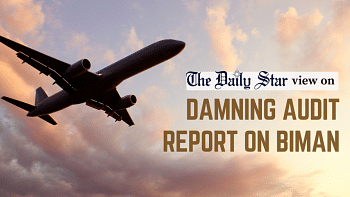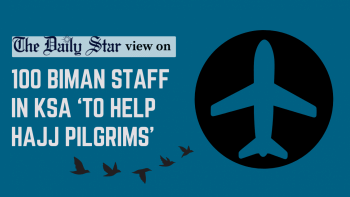Biman’s self-sabotage will not just hurt itself

Biman's sudden U-turn on whether buying two Airbus A350 planes would be profitable or not seems to be driven by factors other than financial viability. In January, after studying the proposal for six months, the airliner concluded that it would be making massive losses—amounting to an accumulated cash shortfall of up to $463.08 million over 25 years—if it bought the planes. Strangely enough, on April 22, a new appraisal committee took over the evaluation and, in only three days, decided that it would be a profitable venture. To come to this conclusion, the second committee seems to have invented all sorts of unrealistic scenarios, as per a report by this daily.
For example, the committee based its calculations on Biman filling 92 percent of seats on average (which it has never been able to achieve), showing an increased revenue of 20 percent compared to the evaluation of the previous committee. But even then, the second committee could only show the Airbus planes to be profitable on two routes. One of those routes is Dhaka to JFK Airport in New York, which Bangladeshi carriers have not been able to serve since the US Federal Aviation Authority placed the Civil Aviation Authority of Bangladesh (CAAB) in its Category 2, after finding irregularities in its operational activities in 2006.
With that being the case, why would the committee even consider taking this route into its calculations? Another reasoning concocted by the committee is that jet fuel cost—which has historically been volatile, and has risen in recent times—would decrease, adding about a quarter of the increased revenue shown.
There are other glaring illogical assumptions at play here. The committee ignored the very costly spare parts that Biman would have to acquire for the Airbuses, the significant rise in expenditure as a result of operating a mixed fleet, as opposed to a Boeing-based fleet, etc. But even the committee had to admit that all this may require a huge overhaul of its current crew and their responsibilities, and that Biman may have to suspend operations in different routes or reduce frequency in different sectors. As such, why is the carrier still trying to push through with the Airbus purchases? Given Biman's coloured past—of defying operation rules and standards, violating procurement rules, scandals and anomalies in staff hiring, etc.—its motive needs to be investigated.
One may recall that on May 5 last year, a joint communique was signed by Lord Dominic Johnson, the UK minister of state in the department for business and trade, and Salman F Rahman, private industry and investment adviser to Bangladesh prime minister, regarding the purchase of eight Airbus A350s and two freighters. But this happened even before Biman carried out a viability study on such a purchase and the first techno-financial committee was formed. So, is Biman's decision being driven by political factors? That must not be the case considering the financial burden it would put on citizens, who ultimately pay for its operation. Biman's Airbus decision must be reevaluated in terms of its economic viability.


 For all latest news, follow The Daily Star's Google News channel.
For all latest news, follow The Daily Star's Google News channel. 











Comments